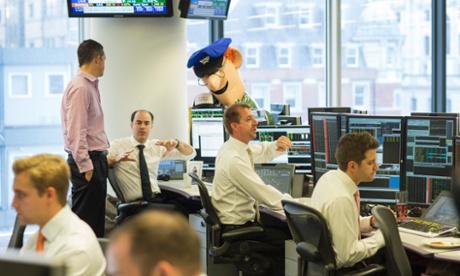
And so the first day of Royal Mail's life as a stock market company has ended. Here's some facts and figures courtesy of Peel Hunt:
• Shares closed at 455p, with the high of the day being 459.75. There was a 20p rally in the last hour.
• Volume traded was 229m shares, roughly 30% of the float, value traded was £1.06bn or more than the next highest value traded 11 FTSE stocks combined
• Low of the day was 431p
• Peel Hunt saw more than 200,000 quote requests. The sell to buy ratio was 6:1 sellers
• But the broker thought less than 5% of the 690,000 individuals allocated stock sold today.
And on that note, it's time to close up for the evening. Thanks for all your comments and we'll be back with the business blog on Monday.
Oops. It appears British Airways rose 66% on its first day, so Royal Mail comes in second. Still a strong performance all round, though.
And it's there. Royal Mail has closed at 455p, a near 38% which by our calculations makes it the biggest first day premium for any UK privatisation.
It also means a near £284 profit before dealing costs for anyone who sold at that price.
Updated
Meanwhile the Royal Mail is on course for the biggest first day rise of any UK privatisation. BT and British Airways both rose around 35%. As things stand Royal Mail is up 37%. We'll know in a few minutes....
Updated
Labour leader Ed Miliband has chipped in with his condemnation of the Royal Mail sale. He said:
This is a fire-sale of a great British institution at a knock-down price. It says it all about this government: bad value for taxpayers and bad value for customers of Royal Mail as well. It is an ideological, dogmatic privatisation by this government, made it even worse by under-valuing Royal Mail.
Royal Mail shares hit new peak
Royal Mail shares meanwhile have seen another surge and are now at a new peak of 459.75p. Perhaps Paddy Power are on to something...
It could take years to work out if Royal Mail was sold on the cheap, reckons market strategist Mike Ingram at BGC Brokers:
So here we are with RMG trading at 440p and the government finds itself in the awkward position of effectively talking down today’s floatation. On BBC Radio 4 this morning, Business Secretary Vince Cable played down the significance of RMG’s surging share price. ‘You get an enormous amount of froth and speculation in the aftermath of a big IPO (Initial Public Offering) of this kind. It’s of absolutely no significance whatever. What matters is where the price eventually settles’ he said.
Well not quite Vince. Looking back at the 600-plus IPOs launched worldwide over the last twelve months, there’s a pretty strong correlation between first day returns and subsequent returns over the following month. The companies that have a strong first day tend to continue doing well. The first rule of investment is to buy at the right price. Perhaps Doctor Cable hopes that by the time ‘eventually’ arrives the press will have moved on to new pastures. In this, at least, he is probably correct.
Of course the broader issue, completely obscured in today’s RMG drama, is that it’s actually very tricky to value companies for the very long term. For instance, consider two former UK privatisation stocks, BT Group (ex-British Telecom) and BG Group (ex-British Gas).
Ingram says analysts think BT is worth anywhere between 405p and 175p per share, with the goalposts at BG even wider: apparently these shares are worth anywhere between 1770p and 736p. He adds:
How much wider could the goalposts be at RMG? Until today it had no share price at all as a reference point and very little track-record. Three years ago, RMG was loss-making. Today’s enthusiasm is based upon the turnaround at RMG continuing – indeed RMG’s access to the equity market is intended to help ensure it – but this is by no means guaranteed.
There can be no doubt that the government could have extracted more money from today’s float, but it might have as easily torpedoed the deal if it had been too greedy. The success or failure of RMG’s privatisation can only truly be judged with any objectivity in years hence.
It will be interesting to see how RMG’s share price holds up next week, as all the retails shareholdings become tradable.
Has the RMG privatisation been flawless? Far from it: pricing could have been keener, better information on the float made available earlier to private investors and all investors should have had an equal opportunity to trade the shares from today.
Is it a vast rip-off of the UK tax payer? Probably wrong also. RMG falls into the vast swathe of financial deals that fill the grey of uncertainty in between. This may make for very dull press, but it is the bread and butter of stock markets.
Back with the Royal Mail, and Paddy Power are looking ahead to next Tuesday when unconditional dealings begin.
According the bookies, the favourite peak price at 15/8 is 501p to 550p and the favourite closing price at 7/4 is 401p to 450p. Here's the full Paddy Power odds, including for the first dividend payment:
Closing share price on Tuesday
300p or less 10/1
301p to 350p 5/1
351p to 400p 2/1
401p to 450p 7/4
451p to 500p 4/1
More than 500p 6/1
Peak price reached on Tuesday
400p or less 12/1
401p to 450p 9/2
451p to 500p 5/2
501p to 550p 15/8
551p to 600p 3/1
More than 600p 5/1
First dividend paid
Less than 8p 7/1
8.0p to 9.9p 3/1
10.0p to 11.9p 6/5
12.0p to 13.9p 9/4
14.0p to 15.9p 11/1
16p or more 12/1
Coming out of the IMF:
After years of strong performance, emerging economies are experiencing a slowdown, and a new round of reforms will be necessary if growth is to be sustained in the face of a more challenging external environment, panelists told a seminar at the IMF-World Bank Annual Meetings.
Full report here.
In the US the budget deadlock continues but with there are growing hopes that a deal to extend the debt ceiling deadline of 17 October can be agreed.
With that background it is not surprising US consumer confidence has dipped, but the fall is not dramatic by any means. The University of Michigan index slipped to 75.2 from 77.5 in September, pretty much in line with expectations. Rob Carnell at ING Bank said:
From a market perspective, this is a mildly encouraging data release, given that it could have been considerably worse. And together with some apparent movement in the debt crisis talks, this release may lift spirits for risk assets, though there is little direct relevance for bonds in this data.
Annalisa Piazza at Newedge Strategy said:
The overall confidence indicator held up relatively well in early October, given the exceptionally uncertain scenario. That said, a downward correction cannot be ruled out at the end of the month, especially if the government agencies shutdown continues.
Markets are rational, and the rise in Royal Mail shares was entirely explicable due to a long behind-the-scenes marketing campaign to institutions, a good dividend yield and the growing expectation of success as the offer progressed.
That is the view of Lex in the Financial Times (£). But the column also warns the shares now look a little overpriced:
At 440p, the shares trade on an enterprise value to 2012 earnings after transformation costs of almost eight. The implied yield falls to 4.5%, below that at Vodafone. This looks pricey relative to postal peers, even though Royal Mail has good scope for margin improvements. Labour unrest looms, and revenue growth is likely to be modest.
We reported earlier that Hargreaves Lansdown's website was crashing on and off due to the amount of investor demand, and now the broker has issued an apology. Chief executive Ian Gorham said:
As some people will be aware, we have experienced unprecedented Royal Mail share trading demand this morning. Whilst clearly we predicted and prepared for substantial activity in Royal Mail shares, the volumes involved have gone off any conventional scale. As a consequence of this quite unprecedented demand for trading, a number of brokers have experienced service issues and Hargreaves Lansdown has
been no different.We have processed many thousands of trades on behalf of our clients, and continue to do so, but some clients will have had difficulty getting through on the telephone and experienced
intermittent website issues. We have six times the normal number of dealing staff working today, and continue to work hard to deal with the demand. We will keep working flat out until our normal fluent
service is restored. We'd like to apologise to our clients for any issues they have experienced this morning.
That hasn't stopped Hargreaves' own shares rising. No Royal Mail, of course, but they are currently up 3p at 997.5p.
We flagged this up in yesterday's blog but here's some video of the Communication Workers Union protesting against the Royal Mail sell-off this morning:
Whether you received shares or not, the government gets a short term benefit from your cash:
Staggering #RoyalMail fact: Vince Cable's nowsitting on £3.3 billion paid up-front by private investors for shares they won't get.
— Joe Murphy (@JoeMurphyLondon) October 11, 2013
@JoeMurphyLondon @alstewitn #RoyalMail What's the daily interest on £3.3 billion? Was this another money making tactic?
— Martin (@MartinPincot) October 11, 2013
Updated
One City expert points out that once short selling in Royal Mail is allowed in the coming days, its shares could lose some of their early gains, given the threat of strike action. Nick Lewis, head of market trading and risk at Capital Spreads, said:
Today we have seen substantial client volumes buying into Royal Mail. Due to stock borrowing restrictions, we cannot allow short selling until the first official public market trading day on Tuesday, so it remains to be seen whether the current buying appetite will swing sharply in favour of short positions. Given all the talk of underpricing, it would not be unreasonable to expect this eventuality. As a consequence we would expect the price to remain around these levels till the full trading is in action, despite the persistent strike rumours which have followed this stock since early discussions of the float. Optimism from both sides of the Atlantic seems to be dominating the price action through to the weekend. However, a postmen’s protest could change investor sentiment at a stroke and, once shorting is permitted, a strike could more than undo the early gains.
Elsewhere, David Cameron has challenged foreign investors today to set up business in Northern Ireland. (Presumably when they're not buying up Royal Mail shares). Henry McDonald writes:
The Prime Minister also said that outside of the City of London, the province is the second top destination for inward investment into the UK.
He was speaking at the opening of an international investment conference in Belfast aimed at attracting more foreign business into Northern Ireland.
In a message to investors and large multi national corporations, the prime minister said: "Put your money in Northern Ireland and be part of this incredible success story"."Some people say it's a bit undignified for a prime minster to make a sales pitch, I say nonsense.
"I'm passionate about the power of business to create jobs and growth and I'm passionate about what Northern Ireland has to offer, and so I'm here today with a very simple message."
He added: "With over 800 foreign investors, Northern Ireland is second only to London in the UK as the top destination for inward investment, with almost 8,000 jobs from foreign investment in the last three years alone."
The prime minister said the success of the G8 in Fermanagh back in June had showcased what Northern Ireland could offer to the world.

Henry continues:
First minister Peter Robinson said "many of the building blocks were in place" to take its economy to a "higher level" such as a highly educated workforce.
Deputy first minister McGuinness said people in Northern Ireland had a "strong work ethic" and more than 60% of school leavers continued their studies by taking either further or higher education courses.
McGuinness also highlighted the quality of life in Northern Ireland as an attractive feature to foreign business. He told investors that they would never be more than an hour's drive from either the sea or the mountains, and could enjoy first class golfing and fishing facilities.
The conference is the first of its kind to be held in the province since the 2008 global economic crash.
Here's some video of Vince Cable defending the Royal Mail pricing as the shares soared (currently at 436.5p):
Updated
And back with the Royal Mail, more than 800 institutions applied for shares, according to my colleague Rupert Neate. Of these 500 were rejected.
Of the 67% reserved for City investors, 90% went to pension funds and institutions. 10% went to hedge funds. Successful investors included Threadneedle, Fidelity, Blackrock and Standard Life.
Some 20% went to sovereign wealth funds including Kuwait and Singapore.
Meanwhile a few investors went punting for slightly more than the minimum:
About 40 private investors applied for more than £1MILLION of Royal Mail shares. (They all got nothing)
— RupertNeate (@RupertNeate) October 11, 2013
Updated
Breaking away from the Royal Mail, JP Morgan just surprised the City by reporting a loss for the last quarter.
The Wall Street bank reported a net loss of $400m for the third quarter of 2013. The cause, legal expenses of $9.2bn, or $7.2bn after tax.
The bank, which last month agreed to pay $920m in charges over the London Whale scandal, is still in talks with US authorities over allegations it mis-sold mortgage securities in the run-up to the financial crisis.
CEO Jamie Dimon said the quarter had been marred by "large legal expense".
JP Morgan reports loss for Q3
— Jill Treanor (@jilltreanor) October 11, 2013
JP Morgon loss includes legal expense of $9.2bn
— Jill Treanor (@jilltreanor) October 11, 2013
More to follow... Nick Fletcher's taking over the blog now, too.
The UK economy could get a small spending boost from the Royal Mail float, if large numbers of investors sell their shares in the coming days.
Philip Shaw of Investec explains:
The current market price is 440p, a 33% increase on the flotation price of 330p. Bearing in mind that over 650,000 individuals received an allocation of 227 shares, we estimate that small investors made an aggregate profit of close to £160m (after subtracting dealing costs).
For illustrative purposes, if all the profit were spent in the high street this would add 0.6% to retail sales.
Updated
A total of 154 million Royal Mail shares have been traded this morning, outstripping any other shares on the FTSE 100.
That means roughly one in four of all shares floated have changed hands in the first four hour's trading.
More than a quarter of all Royal Mail shares flogged by the government have been traded this morning
— Robert Peston (@Peston) October 11, 2013
The Financial Times reports that Jupiter Fund Management has purchased a sizeable amount of Royal Mail’s shares through the IPO.
Alastair Gunn, manager of the Jupiter high income fund, struck a cautious tone having seen the shares jump by a third this morning:
Investors have made some good money. At £3.30, the shares are very good value, but it’s not so clear they are at £4.40. The parcel business needs to be automated and the management will need to take the unions with them on that process.
The continued costs of restructuring will hit profits, so the reason for buying this shares is not quite as clear at £4.40 as it was at £3.30.
Vince Cable said this morning the government had tried to ensure that responsible long-term investors, such as pension funds and insurance groups, were well-represented on the Royal Mail shareholder base.
Worth remembering that the UK government still owns a minority stake in Royal Mail.
It held around 38% of Royal Mail shares after giving 10% to staff, and selling 52% to investors through the IPO. It could still whittle this 38% down to 30% through what City types call the "overallotment option".
So if Royal Mail shares are really worth upwards of four quid each, rather than 330p, that minority stake is also worth more than we thought (Eamonn Butler explains more here, in a piece arguing Royal Mail wouldn't prove undervalued.)
Money: Should you sell your shares?
If you bought Royal Mail shares in the float, you may be wondering whether to hold onto them or sell up. .
Our Money team have looked at the issue here:
What should you do with your Royal Mail shares?
They flag up that those who applied through the government's own website, rather than a City broker, shouldn't be able to sell shares until next week when full trading begins:
The official notices to shareholders will go out on Tuesday 15 October, and after that shareholders can choose to sell or hold on for the dividends – or buy more in the market, should they wish.
If you applied at gov.uk/royalmailshares, you will hear about your allocation within 48 hours of 15 October, and you cannot deal in the shares until you have received your formal "share account statement".
Updated
Chuka Umunna, Labour's shadow business secretary, has criticised the government for not admitting that it undervalued Royal Mail.
He said:
Royal Mail is being sold off on the cheap with taxpayers being shortchanged to the tune of hundreds of millions of pounds. Yet out of touch ministers have ploughed on regardless and claimed this is a 'triumph'.
Heads-up: I mentioned at 8.21 that Vince Cable criticised his 'predecessor' -- Labour kindly flags up that this, of course, was Alan Johnson rather than Chuka Umunna.
Royal Mail unions are still hoping for a strong vote in favour of strike action next week.
Billy Hayes, general Secretary of the Communications Workers Union , told Reuters:
We're confident next week we'll have a big 'yes' vote for strike action.
Hayes said that the jump in Royal Mail's share price this morning showed that the company had been undervalued by a billion pounds, adding:
It's outrageous what's happening today.
In first 2 hrs trading, 49.2% of Royal Mail trades were for 227 shares (13,538 deals of 27,524). Avg price was 445.15p. #RMG #royalmail RO
— IGSquawk (@IGSquawk) October 11, 2013

Royal Mail shares surge - a recap
OK, let's recap on this morning's events.
• Royal Mail has made a spectacular debut on the London Stock Market. Shares in the privatised postal operator surged by 35% the instant trading began, hitting 456p before settling around 445p.
• This means an instant profit of around £250 for hundreds of thousands of people who bought £750 of shares in the hugely oversubscribed application process.
• Had the government sold at 450p, not 330p, it would have raised more than £700m more for the taxpayer.
• At this morning's share price, Royal Mail is worth around £4.5bn, not the £3.3bn the government's advisors estimated. This puts it on track to enter the FTSE 100 index.
• Business secretary Vince Cable has already faced accusations that the government mishandled the IPO by selling shares far too cheaply.
Cable told the Today Programme that the price should settle down, and insisted:
This is a very good deal for shareholders, the government and the country, he insists.
He later told Sky News that "spivs and speculators" shouldn't distract from the important job of putting Royal Mail on a sound commercial footing.
• Over 100 million shares in Royal Mail changed hands in the first couple of hours, as investors raced to take a stake. Many trades were for 227 shares, the amount bought by small investors in the float.
Rupert Neate: Share price spike will fuel undervaluation claims
My colleague Rupert Neate's news story on the Royal Mail's stock market debut is live:
Royal Mail share buyers make instant £250 profit as price soars
Share price rise of 36% will fuel accusations that the government undervalued Royal Mail and shortchanged the taxpayer
Updated
The BBC's Robert Peston reports that around 15,000 Royal Mail staff bought shares out of their own money - on top of their £2,000 allocation of free shares.
Their investment of £52m has already swelled to £70m this morning.
Also, I've learned 15,000 Royal Mail employees paid £52m to buy shares, in addition to their free shares http://t.co/ka1pUrafJW
— Robert Peston (@Peston) October 11, 2013
Stock brokers struggle to cope with demand
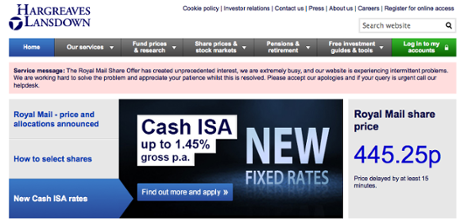
Hargreaves Lansdown's website keeps crashing under the weight of small investors trying to trade in Royal Mail shares.
Its blames "unprecedented demand" and asks shareholders to be patient.
The shares appear to have stabilised at around 445p.
Vince Cable also tells Sky News that the government's aim is to get good value for the taypayer, which he claims the government has done, and putting the company on a better footing
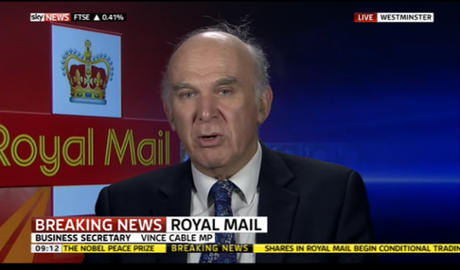
Cable: Never mind the spivs and speculators
Business secretary Vince Cable is up on Sky News, being challenged over the 35% surge in Royal Mail shares this morning.
Cable again denies that the government and its City advisors have botched the job
What really matter is what the shares are worth in three and six-month time.
"Spivs and speculators are of no consequence" to the long-term future of Royal Mail.
Dharshini David challenges Cable over the £700m which the government missed out on by not selling shares at 450p each, rather than the 330p float price.
Absolute nonsense, huffs Cable. We need to think about this institution over years and decades ahead, rather than get worried about the 24-hour new cycle.
Updated
One hour in, and a hefty 100 million shares on Royal Mail have already been traded this morning.
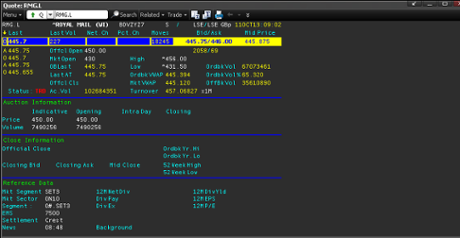
Joshua Raymond, chief marketing strategist at City Index, calls the 36% jump on Royal Mail shares "staggering"
The open will immediately raise questions as to whether the government have fundamentally undervalued the UK institution and this will no doubt be the tone of attacks to the coalition from Labour.
Raymond cautioned, though, that shares in newly-floated companies are "notoriously volatile".
There is always the temptation that given the very public cries that the offering was undervalued, some investors may want to cash in early, especially if prices start to fall back below the 400p level.
Plenty of the Royal Mail trades flashing through on my Reuters machine are for exactly 227 shares -- which will be individual shareholders taking a profit of around £270 each.
There are also much large orders, though, as institutional shareholders buy and sell.
Look at all the 227sssssssssssss #RMG http://t.co/YnHGiWnre5
— Will Hedden (@WillHedden_IG) October 11, 2013
If Royal Mail shares stay at this level, the company should enter the FTSE 100 at the next "reshuffle"
(the London Stock Market adjusts the blue chip index every three months to ensure it includes the 100 most valuable companies).
Getting into the Footsie 100 could give Royal Mail shares another boost, as tracker funds would have to buy into it.
There's about 20 buyers for every seller of Royal Mail shares, reports the BBC's Simon Jack.
Royal Mail staff, who were given £2,000 worth of free shares each, are now sitting on a £3,000 stake in the company.
But not every postal worker took up the offer. Hundreds declined, such as postman Paul Firmage who told us that it was simply a bribe.
Meet the postman who refused Royal Mail shares http://t.co/dcKDABmdR2 (The £2,200 shares he rejected are now worth almost (£3,000)
— RupertNeate (@RupertNeate) October 11, 2013
Updated
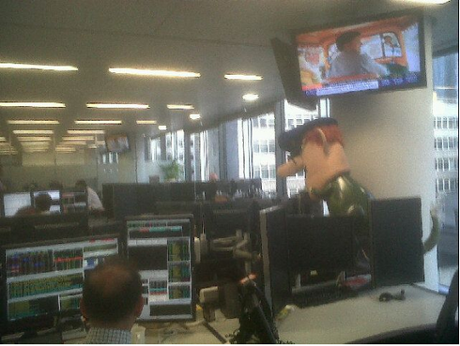
Peel Hunt; prob highest ever number of requests for prices on an individual stock
— Nick Fletcher (@nickfletchergdn) October 11, 2013
Just to clarify, 87 million Royal Mail shares have changed hands so far today, Nick Fletcher reports.
At Peel Hunt, traders reject Vince Cable's claim that today's share price spike is merely 'froth'. They claim it's 'real people' buying and selling shares in the company.
2000 sellers 600 buyers at Peel Hunt so far as private investors cash in
— Nick Fletcher (@nickfletchergdn) October 11, 2013
Peel Hunt: this is not "froth" its real, people buying, selling, averaging down
— Nick Fletcher (@nickfletchergdn) October 11, 2013
Hundreds of millions of Royal Mail shares changing hands
While Vince Cable was defending the Royal Mail floatation (see 8.15am), shares in the company continued to change hands at a huge premium to the 330p float price.
They're currently trading at 447p each.
Updated
The interview then moves onto energy pricing (Cable says people can switch supplier,but admits he hasn't actually done it himself).
They also touch on the row over Edward Snowden's revelations about US surveillance). Cable says that "The Guardian has done a very considerable public service" over this issue.
Evan Davis suggests that the Kuwaiti Royal Family will have more influence on the Royal Mail than the British monarchy, as its sovereign wealth fund is taking a stake in Royal Mail.
Vince Cable replies that the Kuwaiti investors are in it for the long terms. They're "very good investors not fly by night" ones.
Vince Cable denies again that this flotation has been botched, explaining that in the long-term Royal Mail will be a better company.
This is a very good deal for shareholders, the government and the country, he insists.
Royal Mail staff are still planning to strike next week, even though it is too late to stop the privatisation.
Cable replies that he's keen to give workers a firm stake in the company (they got £2,000 of free shares each).
Small shareholders who heard Vince Cable say the Royal Mail share price will settle down soon might decide it's best to sell up now, Evan Davis suggests.
The business secretary replies that he's not about to give investment advice, and criticises "my Labour predecessor" for going around saying the Royal Mail was too cheap.
He may find himself in the middle of a mis-selling scandal in a few months time
Update: Labour flag up that Cable was referring to Alan Johnson...
Updated
Who got the shares?
Vince Cable explains that the government rejected many large bids for from many large investors, to concentrate Royal Mail's ownership among responsible investors, such as "Pension funds and institutions" who are managing the public's money,
Vince Cable: We didn't sell too cheaply
Vince Cable is on the Today Programme now.
He denies that the government has sold the Royal Mail too cheaply, despite shares rocketing up to 450p from the 330p float price
This short-term froth is "Absolutely no significance whatsoever", Cable claims.
My colleague Rupert Neate has calculated that the UK government could have raised an extra £720m if had sold at 450p, not 330p each.
Those who sold their £750 shares at 459p each has made an instant profit of £293, before deducting trading costs.
Make that 459p.
High at 459p so far
— Nick Fletcher (@nickfletchergdn) October 11, 2013
Someone just traded Royal Mail shares at 456p each...
Royal Mail high so far 456, Currently 436
— David Jones (@DavidJones_IG) October 11, 2013
There's a flurry of trading in Royal Mail shares on the trading floor of the City, as investors scrabble to get a stake in the company.
On Peel Hunt's trading floor, Nick Fletcher confirms that millions of shares are being traded as high as 450p each.
Royal Mail shares open at 450p
SHARES IN ROYAL MAIL OPEN AT 450p, my Reuters machine is flashing.
That's a whopping 36% over the offer price.
We need to wait a few minutes for trading to calm down....
Trading is officially underway in the City.....
There could be so much demand that Royal Mail is immediately put in an 'auction process', Nick adds, to give the City trading systems time to cope with the flood of orders....
Royal Mail shares look likely to spike over 400p, from the 330p it was floated at, according to traders at Peel Hunt in the City.
Nick Fletcher reports:
At Peel Hunt, they reckon 420p,some 200,000 already printed premarket
— Nick Fletcher (@nickfletchergdn) October 11, 2013
5m bid at 420p say Peel Hunt
— Nick Fletcher (@nickfletchergdn) October 11, 2013
Here's a flavour of the Guardian's editorial today, on fears that Royal Mail is being sold too cheaply.
The row rumbling through today concerned the caps on large investments, and reserved shares for small investors. This is a great distraction.
If the experience of the 1980s are any guide, the great bulk of the equity will soon be sold on to giant City funds. Every investor has at least £750 to play with, and if the government hands them a windfall then – in current circumstances – that is a disgrace. Britain cannot, apparently, afford to keep disabled people in their homes, or maintain the dole in line with inflation.
And yet, it seems, the resources are still there to parcel up a gift – for those with money to spare.
Have you seen today's Matt cartoon? http://t.co/2HwpJHORhY pic.twitter.com/xzDGTokLuG
— The Telegraph (@Telegraph) October 11, 2013
A reminder of what was announced last night:
• People who applied for the minimum allocation of £750 of Royal mail shares has got the lot, at 330p each (well, £749.10 to be precise)
• those who tried to buy up to £10,000 is also getting just under £750 worth
• Anyone who wanted a bigger slice of the Royal Mail is left empty-handed.
The allocation was handled this way because of the sheer demand for Royal Mail shares - the privatisation is seven-times over-subscribed. Vince Cable, business secretary, argued that this was the fairest way to allocate shares.
Here's our story from last night:
Royal Mail shares: thousands fail in applications for larger stake
Updated
Technically speaking, Royal Mail shares can only be 'conditionally' traded today -- any orders agreed won't actually be fulfilled until Tuesday.
This creates a window for the shares to find their true value (assuming the government's advisors didn't get this important task right).
Will privatised Royal Mail deliver a quick profit?
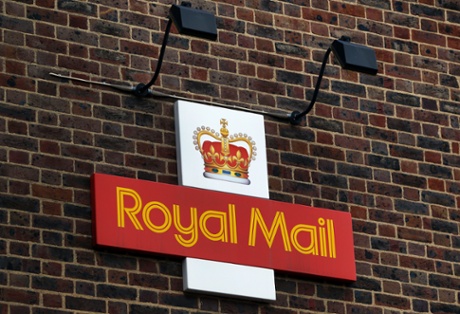
Good morning, and welcome to our rolling coverage of the financial markets, the world economy, the eurozone and the business world.
After 497 years, Royal Mail starts a new life as a private company this morning when conditional trading in its shares begins at 8am BST.
Shares are expected to leap -- which good news for the hundreds of thousands of people who secured £750 of shares in the scramble for a piece of the action official allocation process. However, that would also fuel fears that Britain's venerable postal delivery service has been flogged off on the cheap.
We learned last night that the shares will float at 330p each, despite many analysts speculating that they could 'pop' to as much as 400p this morning.
The Great Royal Mail sell-off is the biggest UK privatisation since RailTrack was shunted off the public books in 1996, so there's plenty of interest in how it performs. Market reporter Nick Fletcher is heading to the Square Mile to watch the action on Peel Hunt's trading floor.
The government picked a good day for Royal Mail's selloff. World stock markets are rallying on optimism that America's politicians could agree a deal to raise its debt ceiling in before next week's deadline. They didn't manage it last night though.
The world's top finance ministers are demanding progress, as they meet in Washington for the G20 meeting today.
We'll be tracking all the action through the day...
Updated







